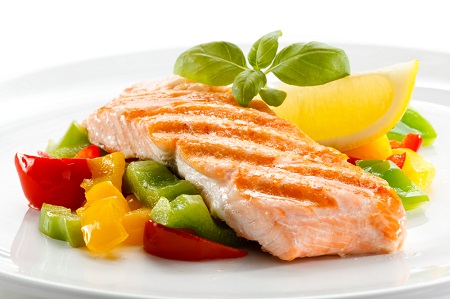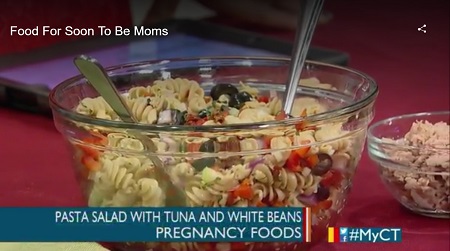All posts by NFI Nutrition
Study: Omega-3s lower risk of fatal heart attack
A new study published in JAMA Internal Medicine today finds that omega-3 fatty acids are associated with a lower risk of dying from heart attacks.
Researchers from around the world formed FORCE (Fatty acids and Outcomes Research Consortium) to pool findings for this 19-study meta-analysis, which included more than 45,000 participants from 16 countries.
After controlling for confounding factors, researchers found that blood levels of omega-3s from both seafood and plant sources were associated with a 10 percent lower risk of fatal heart attacks. Even more striking was that participants with the highest levels of blood omega-3s had a 25 percent lower risk of dying from heart attacks.
In an article for TuftsNow, lead researcher and senior author, Dariush Mozaffarian, M.D., Dr.P.H., dean of the Friedman School of Nutrition Science and Policy at Tufts University in Boston, said “For the leading cause of death in the world, lowering the risk by about 25 percent would be quite meaningful. At a time when some but not other trials of fish oil supplementation have shown benefits, there is uncertainty about cardiovascular effects of omega-3s. Our results lend support to the importance of fish and omega-3 consumption as part of a healthy diet.”
Seafood is the premier dietary source of omega-3s, particularly eicosapentaenoic acid (EPA) and docosahexaenoic acid (DHA). The 2015 Dietary Guidelines for Americans recommend that Americans eat at least 2-3 servings weekly of a variety of seafood, such as salmon, tuna, sardines, trout and herring.
Think Outside the Bun: Grilling with a Twist
Last week, Rima dished about grilling seafood pizza and kabobs on the “Good Morning Virginia” show on WTVR CBS 6 Richmond.
Think outside the bun this summer, and grill up some seafood dishes a couple of times each week. Seafood is a rich source of protein, vitamin D, selenium, B vitamins, iron and heart-healthy omega-3s. In fact, the 2015-2020 Dietary Guidelines for Americans recommend that we eat at least 2-3 servings of seafood each week, and that we replace some meat and poultry dishes with seafood.
Hand-held seafood dishes, like salmon-vegetable kabobs and tuna-spinach pizzas, are perfect for kids (and adults) as a BBQ appetizer or meal. Watch how Rima grills up a tuna-spinach pizza in minutes!
Must-Have Nutrients for Mom + Baby
Last week, Rima dished about important nutrients for expecting moms on Raleigh’s WNCN show, My Carolina Today.
Pregnancy is a critical time for baby development, and there are a few nutrients that are especially important for growing baby and mom.
- PROTEIN — Protein supplies the amino acids that make up the building blocks of the body’s cells, both for mom and baby. This macronutrient is especially important during the 2nd and 3rd trimesters when both mom and baby are growing fastest.
- GOOD SOURCES OF PROTEIN — Seafood, meat and poultry, beans, nuts and seeds, eggs, dairy and soy
- GOAL– Try to include a protein-rich food in every meal and snack. An egg at breakfast, beans at lunch, fish at dinner and nuts and seeds or yogurt for snacks.
- IRON — This mineral is essential for helping to prevent anemia in both mom and baby. Iron is also important for making hemoglobin, the red blood cell that carries oxygen around the body.
- GOOD SOURCES OF IRON — There are two kinds of iron: heme iron found in animal proteins and plant-based iron called non-heme iron. Heme iron–found in red meat, poultry and fish–is more readily absorbed by the body than non-heme iron, which is found in beans, lentils, fortified cereals and pastas.
- TIP: Vitamin C helps boost iron absorption. Top salmon with a citrus salsa, pair spinach with beans or nosh on bell peppers with lentil hummus to “up” iron absorption.
- GOAL — Pregnant women need about 27 mg/day.
- OMEGA-3s — Heart-healthy omega-3 fatty acids like DHA and EPA are essential for baby brain and eye development. Half of a baby’s brain and more than half of a baby’s retina is comprised of DHA. Omega-3s are also important for mom’s heart and brain.
- GOOD SOURCES OF OMEGA-3s — Seafood is the premiere dietary source of DHA and EPA. There are only four fish pregnant women need to avoid: shark, swordfish, tilefish and king mackerel. All other fish and shellfish are safe for pregnant and breastfeeding women to enjoy.
- GOAL — The 2015 Dietary Guidelines for Americans recommend that pregnant and breastfeeding women eat at least 2-3 servings of cooked seafood each week for optimal baby development. It’s as easy as a salmon-egg frittata for brunch one day, a tuna quesadilla for lunch on another and grilled shrimp salad for dinner.
- FOLATE or FOLIC ACID — Folic acid helps to prevent neural tube defects, like spina bifida, in baby, but it’s also important for the production of red blood cells and DNA.
- GOOD SOURCES OF FOLIC ACID + FOLATE — Unlike other nutrients (and most nutrients in general), synthetic or supplemental folic acid is much better absorbed than folate, the version found in food. Pregnant women should take supplemental folic acid and include folate-rich foods (like lentils, beans, dark leafy greens and citrus fruits) as much as possible.








